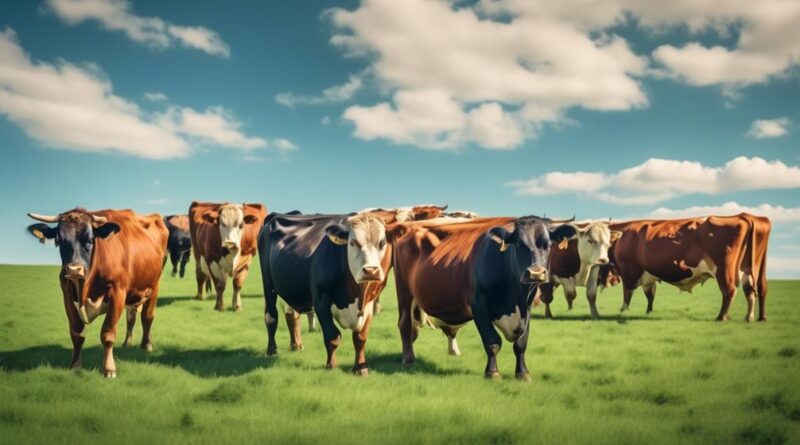6 Best Nutritional Tips for Cattle Reproduction
Did you know that proper nutrition accounts for 60-70% of reproductive efficiency in cattle?
Understanding the best nutritional tips for cattle reproduction is crucial for ensuring the success of your breeding program.
From managing body condition score to ensuring adequate mineral and vitamin supplementation, each aspect plays a vital role in maximizing reproductive performance.
By implementing these nutritional strategies, you can significantly improve the fertility and overall reproductive health of your cattle.
Importance of Nutrition for Reproduction
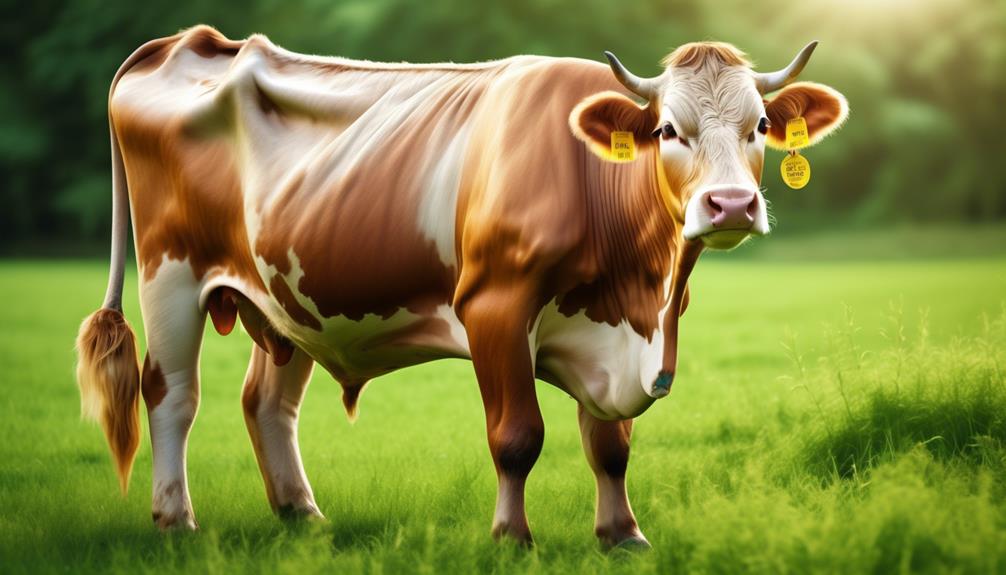
To ensure successful reproduction in your cattle, it's crucial to provide them with proper nutrition throughout their reproductive cycle. Fertility challenges can arise if your cattle don't receive adequate nutrition, leading to decreased reproductive efficiency. Proper nutrition plays a vital role in ensuring that your cattle are in optimal condition for successful breeding and reproduction.
When your cattle face fertility challenges, it can significantly impact their ability to conceive and carry a calf to term. By focusing on providing balanced and high-quality nutrition, you can improve their reproductive efficiency. This includes ensuring that they've access to a well-balanced diet that meets their nutritional needs, including essential vitamins, minerals, and protein.
Inadequate nutrition can lead to delayed estrus cycles, irregular ovulation, and poor conception rates, all of which contribute to fertility challenges. To enhance reproductive efficiency, it's essential to work closely with a veterinarian or animal nutritionist to develop a nutrition plan tailored to your cattle's specific needs. This may involve adjusting their diet based on their reproductive stage and monitoring their body condition to ensure they're receiving the necessary nutrients for successful reproduction.
Key Nutrients for Reproductive Health
Ensuring that your cattle receive adequate amounts of essential nutrients is crucial for maintaining their reproductive health and increasing their fertility. Fertility-boosting nutrients play a vital role in the reproductive performance of your herd. Nutrient deficiencies can lead to reduced fertility, longer calving intervals, and lower conception rates, ultimately impacting the overall productivity of your cattle.
One key nutrient for reproductive health is protein. Protein is essential for the development of reproductive tissues and the production of vital hormones involved in the estrous cycle and ovulation. Ensure that your cattle have access to high-quality protein sources such as legumes, forage, and protein-rich feed supplements to support their reproductive functions.
Another vital nutrient is minerals, particularly calcium, phosphorus, and selenium. These minerals are crucial for maintaining reproductive health, supporting fetal development, and preventing reproductive disorders. Calcium and phosphorus are essential for bone development in calves and for proper muscle function in cows during calving and breeding. Selenium is important for preventing reproductive issues such as retained placentas and metritis.
In addition to protein and minerals, vitamins such as vitamin E and vitamin A are also important for reproductive health. Vitamin E is known for its antioxidant properties, which can help protect reproductive cells from damage, while vitamin A is essential for the regulation of reproductive hormones.
Managing Body Condition Score
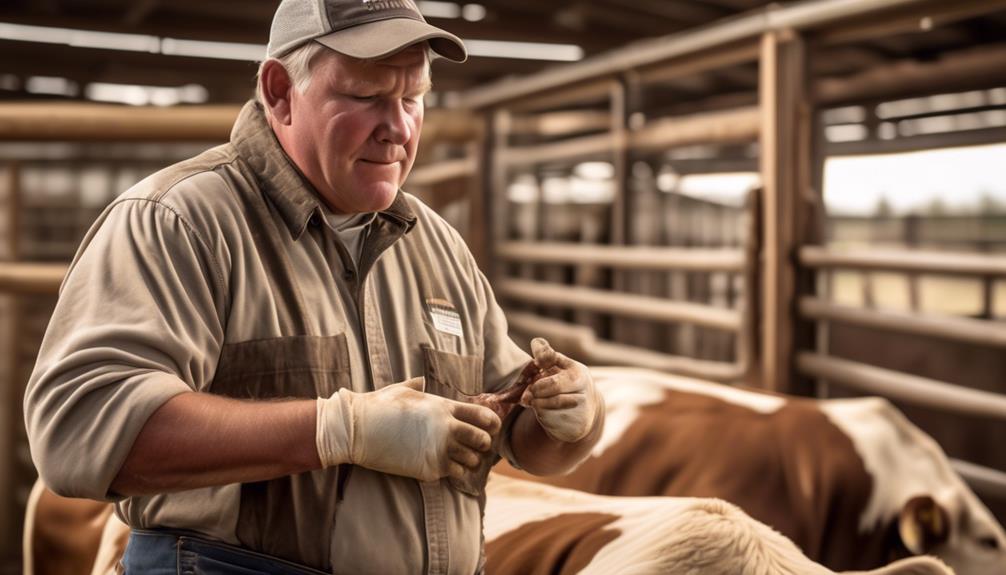
Key nutrients for reproductive health, such as protein and minerals, are also essential for managing body condition score in cattle, directly impacting their reproductive performance and overall well-being. Managing fertility in cattle requires consistent body condition monitoring to ensure that the animals are in an optimal state for reproduction.
Here are some key points to consider when managing body condition score:
- Nutrition: Providing a balanced diet that meets the energy and protein requirements of the cattle is crucial for maintaining an ideal body condition score. This includes access to high-quality forage, supplemented with the necessary minerals and vitamins.
- Regular Monitoring: It's important to regularly assess the body condition score of individual animals to identify any fluctuations or trends. This allows for timely adjustments to their diet or management practices.
- Health Management: Ensuring that cattle are free from diseases and parasites is essential for maintaining their body condition. Health issues can significantly impact body condition score and ultimately affect reproductive performance.
- Reproductive Efficiency: Cattle with an optimal body condition score are more likely to have better reproductive efficiency, resulting in higher conception rates and reduced calving intervals.
Energy Balance and Reproduction
Maintaining a proper energy balance is crucial for optimizing reproductive performance in cattle. When it comes to cattle reproduction, energy balance plays a pivotal role in hormonal regulation and metabolic activity. Hormonal regulation, which includes the release of key reproductive hormones such as estrogen and progesterone, is intricately linked to the energy status of the animal. Inadequate energy levels can disrupt the hormonal balance, leading to irregular estrous cycles and decreased fertility.
On the other hand, a proper energy balance supports healthy metabolic activity, ensuring that the physiological processes necessary for successful reproduction are functioning optimally.
It's important to understand that energy balance isn't just about the quantity of energy consumed, but also the quality of the diet. A well-balanced diet that meets the energy requirements of the cattle is essential for supporting reproductive functions. Energy-dense feeds such as grains and oilseeds can help maintain the required energy levels. However, it's crucial to strike a balance, as excessive energy intake can lead to obesity, which in itself can negatively impact reproductive performance.
Protein Requirements for Breeding Cattle
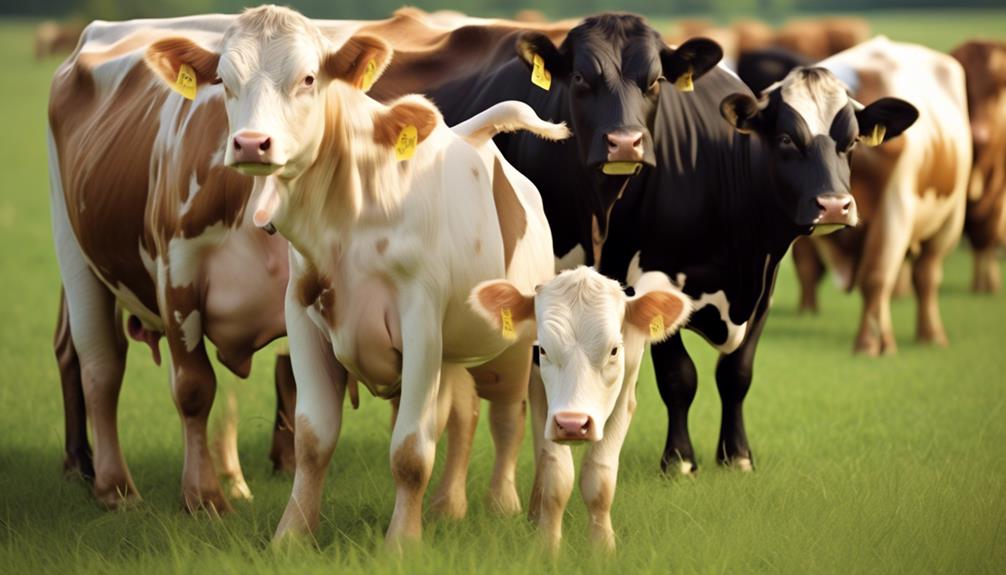
To optimize reproductive performance in cattle, it's essential to consider the protein requirements for breeding cattle, as they play a crucial role in supporting hormonal regulation and metabolic activity. Meeting the protein needs of breeding cattle is vital for ensuring successful reproduction and overall herd health.
Here are some key points to consider when it comes to protein requirements for breeding cattle:
- Protein sources: Ensuring that breeding cattle have access to high-quality protein sources is essential. This includes providing them with protein-rich forages such as alfalfa, clover, and other legumes, as well as quality grass hays. Additionally, grains such as soybeans and canola meal can serve as valuable protein sources for breeding cattle.
- Protein supplementation: In some cases, the natural protein sources available to breeding cattle may not meet their specific nutritional requirements. In such instances, protein supplementation in the form of commercially available protein supplements or blocks can be beneficial. These supplements are designed to provide the additional protein needed to support reproductive processes and overall health.
Meeting the protein requirements of breeding cattle is crucial for optimizing reproductive performance. By ensuring access to quality protein sources and considering supplementation when necessary, cattle producers can support the hormonal regulation and metabolic activity necessary for successful breeding.
Mineral and Vitamin Supplementation
Considering the essential role of minerals and vitamins in supporting cattle reproduction, it's vital to address their supplementation as a crucial aspect of herd health management. Conducting feed analysis is imperative to identify any mineral deficiencies within the herd's diet. This analysis helps determine the specific mineral supplementation required to optimize reproductive performance. Mineral deficiencies, such as low levels of selenium, copper, or zinc, can significantly impact fertility and overall herd health. Thus, ensuring the appropriate mineral supplementation is essential for successful cattle reproduction.
In addition to mineral supplementation, vitamin supplementation also plays a key role in cattle fertility. Vitamin deficiencies can have significant fertility implications. For instance, inadequate levels of Vitamin A and E have been linked to decreased fertility in cattle. Therefore, providing the necessary vitamin supplementation can help address these deficiencies and support optimal reproductive function within the herd.
It is crucial to work closely with a veterinarian or animal nutritionist to develop a supplementation plan tailored to your herd's specific needs. This plan should consider the results of the feed analysis and any identified deficiencies. By addressing mineral and vitamin supplementation, you can effectively support cattle reproduction and contribute to overall herd health and productivity.
Forage Quality and Reproductive Success
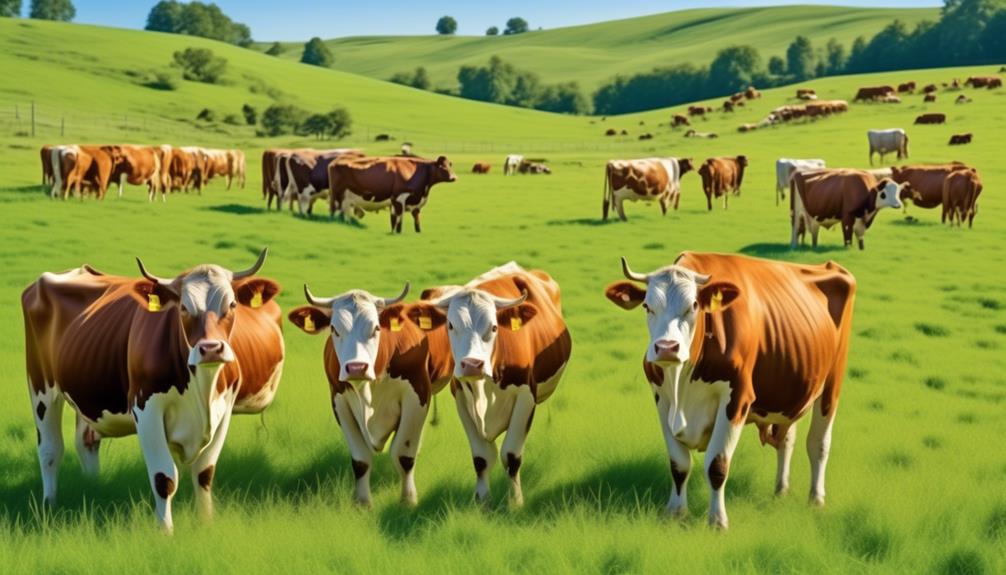
Improving forage quality is essential for maximizing reproductive success in your cattle herd. The nutritional value of the forage directly impacts the fertility outcomes and reproductive performance of your cattle. To achieve optimal forage quality, consider the following strategies:
- Pasture Management: Implement rotational grazing to prevent overgrazing and allow forage regrowth. This strategy ensures that your cattle have access to high-quality forage, which is crucial for their overall health and reproductive success. Additionally, conducting soil tests and applying appropriate fertilizers can enhance the nutrient content of the forage, further supporting reproductive performance.
- Forage Diversity: Incorporate a variety of forage species in your pastures to provide a balanced diet for your cattle. Diverse forage options can contribute to improved reproductive outcomes by offering a wider range of essential nutrients and promoting overall herd health.
- Supplemental Feeding: In some cases, supplementing your cattle's diet with high-quality feed can bolster their nutritional intake, especially during periods of low forage availability. This approach can help sustain reproductive performance by ensuring that the cattle receive adequate nutrition to support their reproductive processes.
- Monitoring and Adjusting: Regularly assess the quality of your forage and make adjustments to your grazing strategies as needed. By monitoring the forage composition and availability, you can proactively address any potential issues that may impact your cattle's reproductive success.
Nutritional Management During Gestation
Maximizing your cattle herd's reproductive success through forage quality directly impacts the nutritional management required during gestation to support optimal fetal development and overall herd health. Gestation nutrition plays a crucial role in ensuring the health and development of the fetus. During gestation, the nutritional needs of the cow increase as the fetus grows and develops. It's essential to provide a balanced diet that meets the cow's increased energy, protein, vitamin, and mineral requirements to support fetal growth and development. Adequate nutrition during gestation is vital for ensuring the health of both the cow and the developing calf.
Fetal development requirements during gestation necessitate a diet that's rich in essential nutrients. Energy-dense feeds such as high-quality forages, grains, and protein supplements are essential for meeting the increased energy demands of the pregnant cow. Protein is crucial for fetal development, and ensuring that the cow's diet contains sufficient high-quality protein is vital. Additionally, providing adequate vitamins and minerals, including calcium, phosphorus, and trace minerals, is necessary to support skeletal development and overall fetal growth.
Monitoring body condition and adjusting the diet accordingly is crucial during gestation. While it's important to meet the increased nutritional needs of the cow, overfeeding should be avoided to prevent complications during calving. By carefully managing the nutritional needs of your cattle during gestation, you can support optimal fetal development and contribute to the overall health and productivity of your herd.
Frequently Asked Questions
What Are the Best Feeding Practices During Heat Stress to Improve Cattle Reproduction?
During heat stress, managing feeding challenges is crucial for improving cattle reproduction. You should focus on providing proper nutrition to support the reproductive system, such as increasing energy and protein intake and ensuring access to fresh water.
How Can Nutrition Impact the Success of Artificial Insemination in Cattle?
Nutritional supplements can significantly impact artificial insemination success in cattle by supporting reproductive hormones. By providing the right balance of nutrients, you can optimize fertility and increase the likelihood of successful insemination in your cattle.
Are There Specific Feeding Strategies That Can Improve the Fertility of Older Cattle?
To improve the fertility of older cattle, consider specific feeding strategies. Proper nutrition can greatly impact their reproductive success. Consult with a veterinarian or livestock nutritionist to develop a tailored feeding plan for your older cattle.
Can Nutrition Affect the Gender Ratio of Offspring in Cattle?
Nutrition plays a role in cattle reproduction, potentially influencing the gender ratio of offspring. Diet quality can impact the reproductive process, affecting the likelihood of producing more male or female calves.
What Role Does Gut Health and Microbial Balance Play in Cattle Reproduction, and How Can Nutrition Support This?
To support cattle reproduction, focus on gut health and microbial balance. Proper nutrition supports this by promoting a healthy digestive system. Balanced feeding practices and managing heat stress also play a crucial role in enhancing reproductive success.
Conclusion
In conclusion, proper nutrition plays a crucial role in the reproductive success of cattle. By ensuring key nutrients, managing body condition score, and providing adequate energy and protein, you can support healthy reproduction in your herd.
Don't forget the importance of mineral and vitamin supplementation, as well as forage quality for optimal reproductive health. With the right nutritional management during gestation, you can set your cattle up for successful reproduction and healthy offspring.
